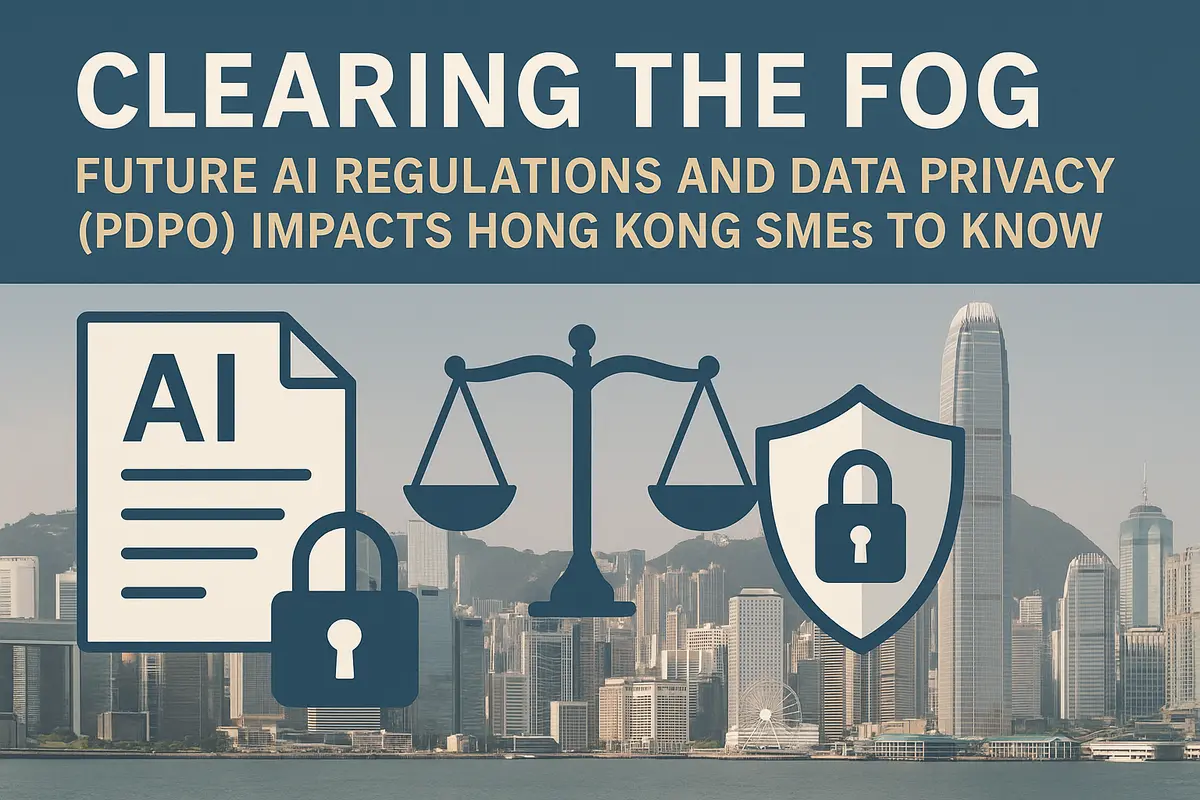
Clearing the Fog: Future AI Regulations and Data Privacy (PDPO) Impacts Hong Kong SMEs Need to Know
AI Advances at Breakneck Speed: How Can Legal Frameworks Keep Up?
Artificial Intelligence (AI) applications are becoming increasingly widespread, with industries discovering its potential to enhance customer experiences, optimize operational efficiency, and drive product innovation. However, alongside the rapid development of AI technology, ethical and legal concerns regarding data privacy, algorithmic bias, and accountability have emerged, drawing significant attention from global regulators.
Represented by the EU's AI Act, many countries and regions worldwide are actively researching or implementing regulatory frameworks for AI. While Hong Kong currently lacks comprehensive legislation specifically targeting AI, this does not mean businesses can use AI without caution. Existing laws like the Personal Data (Privacy) Ordinance (PDPO) and industry-specific regulatory guidelines still impose clear requirements on how companies collect, use, and protect personal data—including data processed by AI systems.
For Hong Kong's SMEs, understanding the potential direction of future AI regulations and their impact on existing data privacy compliance requirements is crucial. This not only helps businesses mitigate legal risks but also builds customer trust and enhances long-term competitiveness.
Regulatory Focus: Key Areas Future AI Regulations May Address
Drawing on international trends and local discussions, future AI regulations or guidelines may focus on the following key areas:
-
Data Governance and Privacy:
- Core Issue: AI systems—especially machine learning models—often require vast amounts of data for training and operation. How can businesses ensure this data is collected and used legally, fairly, and transparently? How can personal data privacy be safeguarded in AI applications?
- Potential Impact: Before deploying AI, businesses may need to scrutinize the legality of their data sources more rigorously, ensuring necessary consent is obtained (especially for sensitive personal data). Personalized recommendations or decisions made by AI systems must also consider their impact on individual privacy.
-
Algorithmic Transparency and Explainability:
- Core Issue: Many advanced AI models (e.g., deep learning networks) operate as "black boxes," making their decision-making processes difficult to explain. When AI decisions significantly impact individuals (e.g., credit approvals, hiring screenings, medical diagnoses), how can fairness and reasonableness be ensured?
- Potential Impact: Regulators may require businesses using high-risk AI systems to maintain a degree of transparency, enabling them to explain how their AI models reach specific decisions—particularly when outcomes are adverse to individuals.
-
Bias Mitigation and Fairness:
- Core Issue: AI model performance heavily depends on training data. If the data contains biases (e.g., gender, racial, or age biases), the AI may replicate or even amplify these biases, leading to unfair outcomes.
- Potential Impact: Businesses developing and deploying AI systems must take steps to identify and mitigate algorithmic biases, ensuring decisions are fair across different groups. This may involve dataset audits, algorithm adjustments, and ongoing monitoring.
-
Accountability and Human Oversight:
- Core Issue: When AI systems fail or cause harm, who is accountable? Under what circumstances must humans intervene in AI decision-making to review or retain final authority?
- Potential Impact: Businesses must establish clear accountability mechanisms, defining responsibilities for AI developers, deployers, and users. High-risk AI applications may require mandatory human oversight to prevent fully autonomous and uncontrollable decisions.
Practical Implications and Actions for Hong Kong SMEs
What do these potential regulatory trends mean for Hong Kong SMEs?
- Stricter Data Handling Policies: Businesses must review and update internal data handling policies and procedures to comply with PDPO and prepare for potentially stricter AI regulations.
- Careful Evaluation of AI Tools and Vendors: SMEs should exercise greater caution when selecting third-party AI tools or services, assessing how data is processed, whether algorithms exhibit biases, and vendor compliance.
- Potential Increase in Compliance Costs: Meeting new requirements—such as conducting data impact assessments, algorithm audits, or enhancing security measures—may incur additional costs.
- Need for Transparency and Trust-Building: Clearly explaining AI usage and data privacy protections to customers and the public fosters trust, a critical advantage in competitive markets.
Proactive Compliance Steps for SMEs:
- Review Current Data Practices: Ensure personal data collection, use, storage, and disposal strictly adhere to PDPO's six data protection principles.
- Document AI Usage: Maintain records of AI systems (whether developed in-house or third-party), including their purpose, data sources, key functions, and potential risks.
- Prioritize Transparency: Clearly disclose in privacy policies or terms of service how and why AI processes personal data.
- Train Employees: Raise staff awareness of data privacy and AI ethics to ensure compliance when using AI tools.
- Monitor Industry Guidance: Stay updated on the latest AI and data privacy guidelines from the Office of the Privacy Commissioner for Personal Data (PCPD) and relevant industry bodies.
How Frasertec Limited Helps You Navigate Compliance Challenges
In an increasingly complex regulatory landscape, ensuring AI compliance can be challenging for SMEs. Frasertec Limited prioritizes data security and compliance when building systems and solutions for clients:
- Compliance-Centric System Design: Our [custom software development] integrates PDPO and industry compliance requirements from the outset, embedding privacy protections and security measures into system architecture.
- Expert Technical Consultation: Our [technical advisory services] help SMEs understand AI regulations, assess compliance of existing systems and data processes, and recommend improvements.
- Secure Data Processing Solutions: We assist in designing and implementing secure data storage, processing, and transmission solutions to minimize breach risks.
- Tools for Transparency and Explainability: When developing AI applications, we employ techniques that enhance transparency and explainability, helping you better understand and manage AI decision-making.
Call to Action: Prepare Now, Embrace AI Compliance Proactively!
The AI regulatory landscape is still evolving, but one thing is certain: requirements for data privacy and responsible AI will only grow stricter. Instead of waiting for regulations to take effect, start proactively reviewing and improving your AI and data practices today.
Businesses that embrace compliance and prioritize data privacy will not only mitigate legal risks but also earn customer trust and market respect.
Want to learn more about ensuring compliance in the AI era or assess risks in your current AI applications?
Contact Us on WhatsApp Now

